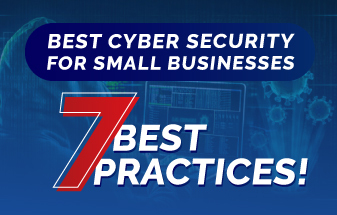
Small businesses often face cybersecurity threats that can have a devastating impact on their operations, finances, and reputation. Cybercriminals usually target small businesses because they often have weaker security measures compared to larger organizations.
Therefore, it’s important to implement the practice techniques that guarantee the best cyber security for small businesses.
7 Practices for the Best Cyber Security for Small Businesses
Practices for the Best Cyber Security for Small Businesses includes:

Train Employees on Cyber Security Awareness
Employees play an extremely critical role in the cybersecurity for small businesses. That’s why they should be well trained on how to recognize and avoid phishing attacks, social engineering, and other common cybersecurity threats. Regular training and awareness programs can help employees understand the importance of cybersecurity and how to protect their company’s assets.
Use Strong Passwords and Multi-Factor Authentication
Passwords are the first line of defense against cyber threats. Weak passwords are an easy target for cybercriminals. That’s why small businesses need to enforce strong password policies for their website’s users. Passwords should be complex, contain a combination of uppercase and lowercase letters, numbers and special characters.
Moreover, two-factor authentication (2FA) is another layer of security that requires users to provide an additional form of identification, such as a security token or a code sent to their mobile device.
Implement Firewalls and Antivirus Software
Firewalls and antivirus software can protect small businesses from malware, viruses, and other cyber threats. Small businesses should ensure that their systems have up-to-date firewall and antivirus software installed and configured properly.
In addition to that, using a web application firewall (WAF) can protect small business websites from common cyber threats. WAFs analyze web traffic and block malicious traffic such as SQL injection attacks, cross-site scripting (XSS) attacks, and other types of attacks. Also, small businesses can use cloud-based WAFs or implement WAFs on their own servers.
Use Encrypted Communication Channels
One of the most important measures to consider in order to guarantee the best cyber security for small businesses is the usage of encrypted communication channels, such as virtual private networks (VPNs), to protect their sensitive data.
VPNs work by encrypting data as it travels between devices, which makes it more difficult for cybercriminals to intercept and steal it. Also websites should use SSL certificates to encrypt the connection between servers and websites.
Backup Data Regularly and Keep Software Updated
Small businesses should backup their data regularly to prevent data loss due to cyberattacks or intentional/unintentional mistakes or other disasters. Backing up the data regularly is considered one of the website security best practices. Moreover, backups should be stored in a secure location, such as a cloud-based service or an off-site location.
In addition to regular backups, small businesses should ensure that their website’s software, including the content management system (CMS), plugins and themes, are updated on a regular basis. Hackers often exploit vulnerabilities in outdated software to gain access to websites. Updates often include security patches that address known weakness points.
Limit Access to Sensitive Data
Small businesses should limit access to sensitive data to only those employees who necessarily need it to perform their job requirements. Access controls and permissions should be implemented to ensure that only the authorized personnel can have access to sensitive data.
Conduct Regular Security Audits
Small businesses should conduct regular security audits to identify vulnerabilities and areas for improvement. Audits can help businesses proactively address security risks and take steps to mitigate them.
What are the Most Common Types of Cyber Attacks on Small Businesses?
Most Common Types of Cyber Attacks on Small Businesses:

Phishing Attacks
Phishing attacks are one of the most common types of cyber-attacks on small businesses. In a phishing attack, cybercriminals send fraudulent emails or messages that appear to be from a trustworthy source, such as a bank or a well-known company. The goal is to trick the recipient into providing sensitive information, such as login credentials, payment information or personal data.
Ransomware Attacks
Ransomware attacks are another common type of cyber-attack on small businesses. In a ransomware attack, cybercriminals use malware to encrypt a business’s files or data and demand a ransom payment in exchange for the decryption key.
Social Engineering Attacks
Social engineering attacks involve tricking people into divulging confidential information or performing an action that is not in their best interest. Social engineering attacks can take many forms, such as phishing, pretexting, baiting, and quid pro quo.
Malware Attacks
Malware attacks involve the use of malicious software to gain unauthorized access to a business’s systems or data. Malware can be spread through email attachments, infected websites, and malicious software downloads.
DDoS Attacks
Distributed Denial-of-Service (DDoS) attacks involve overwhelming a business’s website or network with traffic, making it inaccessible to legitimate users. DDoS attacks can be used to extort money from businesses or to disrupt their operations.
In conclusion, small businesses are vulnerable to a variety of cyber-attacks. That’s why it’s essential to implement strategies to guarantee the best cyber security for small businesses.